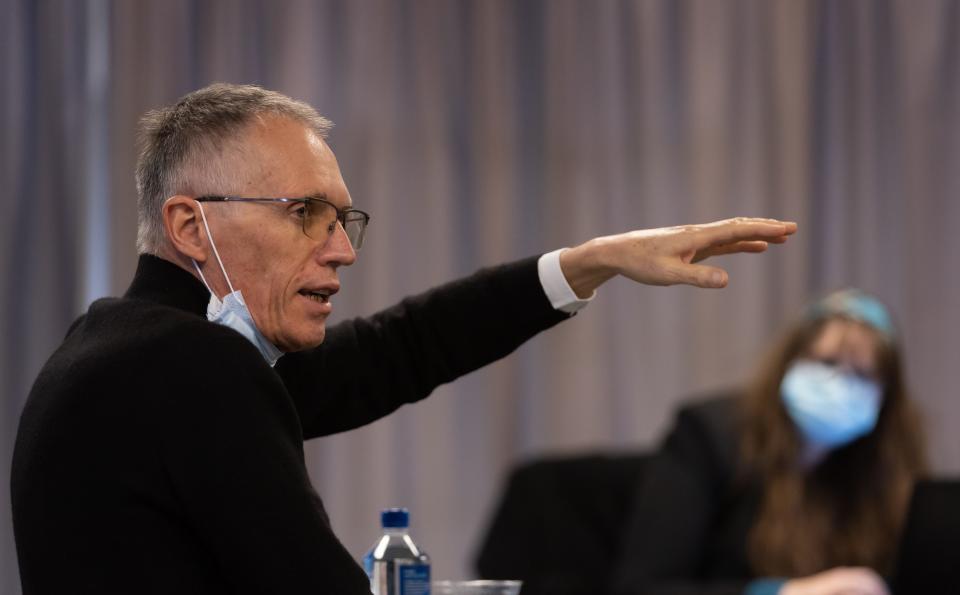Stellantis CEO says changing economic climate will have implications for startups
- Oops!Something went wrong.Please try again later.
Stellantis CEO Carlos Tavares said Wednesday that the changing economy will have implications for the world of startups and is proving the value of the company's bet on them this year.
Tavares made his comments during an online awards announcement to highlight the company's partnerships with startups.
Because governments are boosting interest rates to fight inflation, getting access to funding won't be so easy for startups in the future, according to Tavares, who said the situation is a result of the additional “monetary mass that was put in the market."
That's apparently a reference to the efforts governments undertook to battle the economic toll of the coronavirus pandemic, such as by issuing stimulus payments to individuals.
The period of "free money" will disappear as interest rates rise, he said during a company webcast.

"If we increase the interest rates then the free money is over, which means some of the startups will have a little bit more difficulties to develop themselves,” Tavares said.
Earlier this year, Stellantis announced it was creating a now-$302 million (300 million euros) venture capital fund. The company said it would invest in both early and late-stage startups in the automotive and mobility sectors.
The company said it had two goals: finding ventures that would be financially sustainable and, more importantly, customer-focused. The effort is designed to allow the company to find innovative technologies that can be developed more quickly than through traditional automotive industry processes and help the company meet its goals as outlined in its Dare Forward 2030 plan.
On Wednesday, Tavares said Stellantis had signed 40 different contracts with 40 startups, and the company announced the finalists of what it called its 2022 Stellantis Startup Awards, highlighting seven standout operations it's working with in areas ranging from customer service to supply chain improvements to "agility and efficiency."
The finalists were involved in operations in different parts of the globe, including Brazil, France, Turkey and the United States, where an emergency alert system to warn drivers of road hazards in real time is being offered on a limited number of Jeep, Ram, Chrysler and Dodge vehicles, according to a news release. Each received a non-fungible token, or NFT, trophy, which was described as "an artistic interpretation of intertwined hands expressing the concept that in turbulent times, ideas prevail."
More: Chrysler-parent Stellantis 'ready to deploy' $329M venture capital fund
More: One-time tourist hotspot to supply key electric car battery ingredient for Stellantis
One of the startups highlighted was Phygitall, under the heading of Industry 4.0. The startup developed a system that was rolled out at Stellantis' Betim, Brazil, engine plant. Employees would wear smart watches to "analyze the pattern and intensity of hand movements to optimize the manufacturing process, increasing safety, quality and efficiency," a news release said.
According to a presentation on the process, it allowed the comparison of how workers operated on different shifts at the plant.
Ned Curic, Stellantis' chief technology officer, said Stellantis officials learned that the company can save a significant amount of time at a range of tasks in a manufacturing plant. The company had a sense of this previously but didn't have a way to measure it.
More: New fully electric Jeep unveiled as Stellantis CEO touts plans for next decade
More: Millions of Jeeps and Rams are about to get this lifesaving new safety feature
“I think this is an area of immense transformation where we can do the same tasks much faster,” Curic said.
In response to a number of questions about how employees in Brazil responded to the technology and whether it would be implemented in the United States, Tavares referenced a need for the company and its people to be willing to change.
“Employees are very, very thoughtful people. They perfectly get the fact that if we do not change, we disappear,” he said.
Tavares indicated that the company's larger scale as a result of the merger that created it early last year will help it navigate the evolving automotive landscape and manage the necessary investments, but that internal change is also needed.
“They have understood that in the Darwinian world if we do not change we disappear regardless of our scale ... but scale helps to dilute the enormous investments that we need to make,” Tavares said.
Contact Eric D. Lawrence: elawrence@freepress.com. Follow him on Twitter: @_ericdlawrence. Become a subscriber.
This article originally appeared on Detroit Free Press: Stellantis CEO: Higher interest rates mean 'free money' is over

